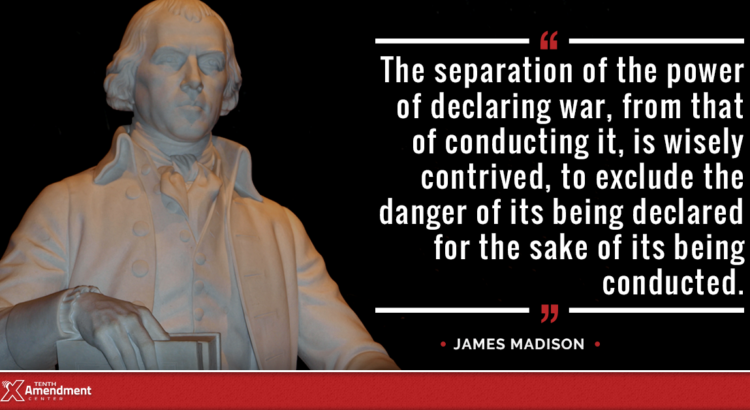As I set forth last week (To Declare or Not to Declare, that Is the Question – Part II), free societies should only go to war when they have been attacked or there is the threat that their lives, liberties and property are in danger of being attacked and destroyed. The follow up question for us then becomes, “Why is the power to ‘declare’ war vested by our Constitution in the Congress and not left up to the President as he is the ‘Commander-in-Chief’ of our military?”
To answer this question we need to return to the Constitutional Convention of 1787 and understand the mindset of those who were framing our Constitution. If you read Jefferson’s Declaration of Independence you will see where several of the charges levied against King George III was his absolute control of Britain’s military and his abuse of that power. One of those charges was the fact the army was not under civil control. Repeatedly throughout the debates in the convention n 1787 the delegates expressed deep concern over the danger of having a standing army. They wisely did not want to vest in the hands of one individual the power to commit the country to war. Instead they chose to vest it in the legislature.
Why the legislature? In his essay of August 24, 1793, writing under the pseudonym “Helvidius”, James Madison made the case in this fashion:
“The natural province of the executive magistrate is to execute laws, s that of the legislature is to make laws. All his acts therefore, properly executive, must pre-suppose the existence of the laws to be executed….Another important inference to be noted is that the powers of making war and treaty being substantially of a legislative, not an executive nature….There can e no relation worth examining between this power” [making war] “and the general power of making treaties. And instead of being analogous to the power of declaring war, it affords a striking illustration of the incompatibility of the two powers in the same hands those who are to conduct a war cannot in the nature of tings, be proper or safe judges, whether a war ought to be commenced, continued, or concluded. They are barred from the latter functions by a great principle in free government, analogous to that which separates the sword from the purse, or the power of executing from the power of enacting laws.” [“Helvidius” No 1]
Madison’s argument, summed up, is the President, as the chief executive, is charged only with executing that which has been authorized by the legislature. Consequently, the President cannot, on his own, execute a condition of war – only when authorized to do so by the legislature. He supports that argument by stating that since a treaty which would conclude a war cannot take effect unless ratified by the Senate (Article II, Section 2), then neither can the commencement of the war without consent of the legislature.
This raises one final question, namely, does “declaring” war, based upon the foregoing argument by Madison regarding the conclusion of a war by treaty, only require the consent of the Senate, or does it require the House’s consent as well? Article I, Section 8 states that “The Congress shall have the power to…declare war.” Since Article I, Section 1 defines Congress to “consist of a Senate and House of Representatives,” then yes, both houses must agree on a declaration of war. But, why both? The answer is simple: if a war is engaged, it will be the people who will suffer the cost and pain of the war (not to mention their liberty and property being put at risk), and the sovereign states whose existence could be put in jeopardy, should have the decision-making power as to whether to put themselves in peril. Since the House represents the people and the Senate originally was to represent the interest of the states, both must concur on such drastic action.
Having now answered the questions of “Why”, “When” and “Who” in respects to declaring war, we will next turn our attention to answering the questions “How” and “What” when war is “declared.”
-May 19, 2017
